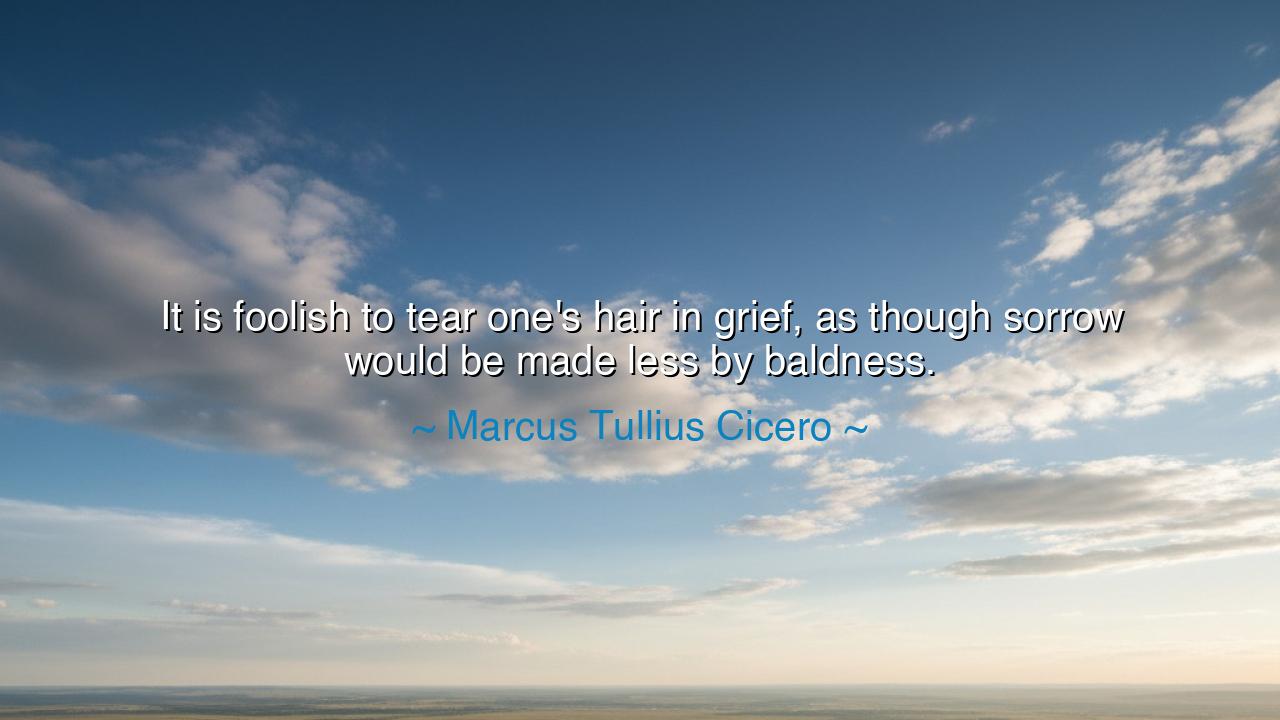
It is foolish to tear one's hair in grief, as though sorrow
It is foolish to tear one's hair in grief, as though sorrow would be made less by baldness.






"It is foolish to tear one's hair in grief, as though sorrow would be made less by baldness." — Marcus Tullius Cicero. These words of wisdom, spoken by the great Roman orator, are as poignant today as they were in the time of the Republic. In them, Cicero imparts a simple yet profound truth: that grief, while a natural part of life, does not benefit from self-inflicted torment. To weep uncontrollably, to tear at one's hair or to rend one's garments in sorrow, is an act of futility—a gesture that, while it may provide temporary release, does nothing to alleviate the deeper pain of loss. True healing, Cicero reminds us, does not come from outward displays, but from inward acceptance and the courage to endure.
In the annals of history, we find countless examples of figures who were consumed by grief and who sought to express that grief through dramatic actions, only to find that such gestures brought them no closer to peace. Achilles, the greatest of the Greek warriors, is a prime example. In Homer's Iliad, we witness Achilles, upon the death of his dear friend Patroclus, consumed by an almost irrational sorrow. He drags the body of Hector around the walls of Troy in a display of rage and grief, hoping that this act of vengeance might ease his pain. Yet, as Cicero suggests, such actions do not heal. Achilles' grief was not assuaged by his violent acts, but rather, it was only through the acceptance of his own mortality and the coming of fate that he was able to move beyond his sorrow.
Cicero's wisdom also speaks to the universal truth that grief must be allowed its due time, but it must not define us. We must not let our sorrow consume us, for there is no strength in surrendering ourselves to the storm of emotion. Think, for instance, of the fate of King David in the Bible, whose heart was crushed by the death of his son Absalom. David’s grief was deep, and he wept bitterly. Yet, when the time came for him to lead his people, he rose from his mourning and put on the mantle of his kingly duties once more. His sorrow did not lessen the loss, but it did not defeat him either. David's example teaches us that while grief is a natural and necessary emotion, we must not let it overwhelm us. We must learn to bear it, not by becoming lost in it, but by facing it with courage and dignity.
Consider also the great philosophers who have confronted the nature of grief and suffering. Epictetus, the Stoic philosopher, taught that we should not grieve over the things we cannot control. We cannot undo the past, nor can we bring back the dead. The pain of loss will come, but how we react to it defines us. Cicero would likely have agreed with Epictetus, for both men believed that the key to wisdom and peace lies in mastering our emotions, not allowing them to control us. The grief we feel is natural, but to wallow in it is to give away our power. Cicero’s lesson is that true strength comes not from the outward expression of sorrow, but from the inward resolve to endure and rise above it.
This wisdom is not merely for the great kings and philosophers of history; it is for each of us, in the daily struggles of life. When we face loss, whether the passing of a loved one, the end of a relationship, or the death of a dream, the natural impulse is to react in despair. Tearing our hair, rending our garments, or making a spectacle of our pain may seem like an outlet, a way to release the pressure of sorrow. But as Cicero so wisely states, this does not change the reality of our grief. It does not heal the wound; it only draws attention to it. Instead, we must learn to grieve with quiet dignity, to feel our sorrow deeply, but not to let it define us. Grief, like all emotions, must be embraced and felt, but it must not be allowed to dominate our lives.
The lesson here is one of balance—to grieve without becoming lost in grief, to mourn without surrendering to despair. This requires strength, the strength to feel the pain and yet continue to live, to move forward with our lives, even as we carry the weight of loss. We must learn to embrace our grief as part of the human experience, but we must also remember that there is wisdom in endurance, in facing our sorrow with resilience and grace.
And so, when grief visits you, do not look for an outward sign to express your pain. Do not tear at your hair or rend your clothing as if that will lessen the weight of your sorrow. Instead, look inward, and find within yourself the strength to endure. The pain may not vanish, but in accepting it and embracing it with dignity, you will find the peace that comes from knowing that you have not been undone by your sorrow. Like the great souls who have gone before you, choose the path of strength, and know that grief, though it may always be with us, will not overpower us if we face it with courage.






AAdministratorAdministrator
Welcome, honored guests. Please leave a comment, we will respond soon